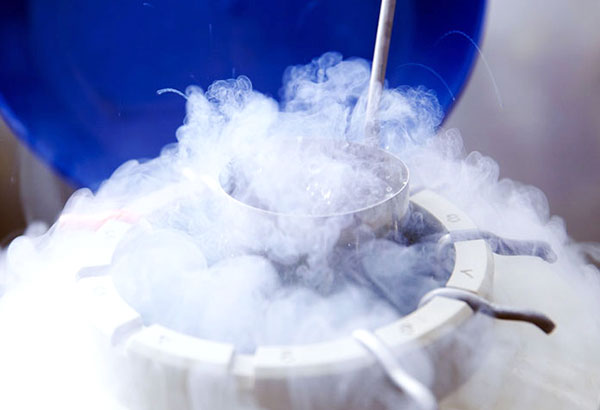
Vitrification is the medical term used for the process of egg or embryo freezing
Social egg freezing is usually carried out by elderly single ladies who haven’t yet found the Mr. Right and would like to preserve their fertility for when the time is right.
In this process the women is administered hormonal injections from the second day of the period for a duration of about 11 or 12 days to target a multifollicular development.
Then around the 13th or 14th day of the period, under anaesthesia a procedure of egg retrieval is done with the help of transvaginal sonography.
These eggs are treated with a cryoprotectant solution and then frozen at minus 196 degrees celcius. The eggs can be preserved indefinitely by this procedure.
When the time is right, these eggs can be thawed and fertilized with the correct partners sperms using ICSI, and they will retain the same fertility potential as the day they were frozen.
 Women with cancer requiring chemotherapy and/or pelvic radiation therapy that may affect fertility.
Women with cancer requiring chemotherapy and/or pelvic radiation therapy that may affect fertility. Surgery that may cause damage to the ovaries.
Surgery that may cause damage to the ovaries.
 Risk of premature ovarian failure because of chromosomal abnormalities (e.g. Turner syndrome, fragile X syndrome), or family history of early menopause.
Risk of premature ovarian failure because of chromosomal abnormalities (e.g. Turner syndrome, fragile X syndrome), or family history of early menopause. Ovarian disease with risk of damage to the ovaries.
Ovarian disease with risk of damage to the ovaries. Genetic mutations requiring removing the ovaries (e.g. BRCA mutation).
Genetic mutations requiring removing the ovaries (e.g. BRCA mutation). Fertility preservation for social or personal reasons to delay childbearing.
Fertility preservation for social or personal reasons to delay childbearing.The optimal age to freeze eggs is 32-36, but any woman ages 30-40 should consider egg freezing if they plan to delay a family. The number of eggs a woman needs is dependent upon her age, but age is only one predictor and not every 35 year old or 40 year old are the same. Therefore, there is not necessarily an absolute upper age; although women less than and equal to 40 will have better success and studies have shown egg freezing is cost effective until age 38
Freeze your biological clock until the time is right for you!
When the woman is ready to use the frozen eggs to achieve pregnancy, these cryopreserved eggs are placed in warming solution and assessed. Those eggs that survived the freezing process are fertilized with intracytoplasmic sperm injection (ICSI), where a single sperm is injected directly into the egg, and the fertilized eggs will grow in culture until the embryo(s) are ready to be transferred into the uterus to achieve pregnancy, typically 3-5 days after fertilization.